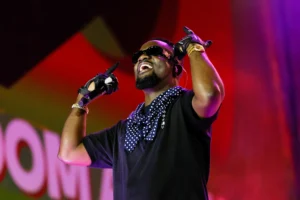From Kasahare Level battles to continental stardom, the story of the man who made Twi rap global.
It’s late afternoon in Tema, and the air is heavy with salt from the nearby port. The neighborhood hums with trotro horns, street vendors calling out their wares, and the tinny echo of hiplife beats spilling from roadside speakers. In the middle of it all, a teenage Michael Owusu Addo — baggy jeans hanging loose, notebook tucked under his arm — walks with the kind of quiet urgency that belongs to someone who knows his future depends on every step.
His destination is Adom FM. Not for an interview. Not yet. This is Kasahare Level — a gritty, no-holds-barred rap battle show that, in the mid-2000s, was the heartbeat of Ghana’s underground scene. Inside the studio, the air is thick with sweat, anticipation, and bravado. You wait your turn. You step to the mic. You have one chance.
When his moment comes, Sarkodie spits like he’s running a race only he can see the finish line to — breathless bursts of Twi packed with internal rhymes, double entendres, and the kind of control that makes people glance at each other like, Did you hear that?
“That was the moment we all knew,” one former Kasahare Level host tells me. “He wasn’t just another Tema boy who could rap. He was a machine.”
A Childhood in Fragments
Long before the mic, there was survival. Born on July 10, 1985, in Tema, Sarkodie was the fourth of five children. His father worked for the Ghana Ports and Harbours Authority; his mother was largely absent from his early life — so absent that he wouldn’t meet her until junior secondary school. For a time, he lived with an elderly woman in Achimota, an arrangement he later described as abusive.
“I learned to stay quiet and work,” he’s said in interviews. “When you go through certain things young, you understand early that no one’s coming to save you.”
The escape was art — sketching designs, writing rhymes, studying flows from American tapes passed around like contraband. He enrolled at Tema Methodist Day Senior High School, then studied graphic design at IPMC College of Technology. But the streets, the radio battles, the chance to turn words into currency — that was the real education.
The Breakthrough: Edem, Hammer, and the Last Two
The Kasahare Level circuit put him in the path of Duncan Williams, his first manager, and Hammer, the legendary producer behind The Last Two. Around the same time, Sarkodie met Ayigbe Edem, then riding the wave of his own underground fame.
When Edem was recording his debut album Volta Regime (2009), he brought Sarkodie on board for Give It Up and You Dey Craze. The tracks dropped like grenades into the Ghanaian rap scene — Twi rap had never sounded so airtight, so poised for export.
“Edem gave me a platform,” Sarkodie later said. “He didn’t have to, but he did. And once I got that mic, I knew I couldn’t go back.”

Makye & Rapperholic: The Landlord Arrives
His debut, Makye, executive produced by Hammer, was released in 2009 and instantly marked him as Ghana’s next big thing. By 2012, Rapperholic pushed him over the edge. The album spawned hits like You Go Kill Me and Onyame Nhyira, blending razor-sharp lyricism with radio-friendly hooks.
That same year, Samsung signed him as a brand ambassador — an unheard-of endorsement for a Ghanaian rapper at the time — and the international invites started rolling in.
In 2012, he picked up his first BET Award for Best International Act, Africa. Ghana had always had rap stars. Sarkodie was the first to feel like he could sit comfortably on a global hip-hop table.
Entrepreneurship & the Adonai Era
By the mid-2010s, Sarkodie wasn’t just an artist; he was a brand. He launched Sark by Yas, a fashion line reflecting his street-luxe aesthetic, signed deals with FanMilk and Tigo, and in 2014, founded Sarkcess Music — his own label.
That same year, the Adonai (Remix) with Castro became a continental anthem. The song’s bittersweet legacy was cemented when Castro tragically disappeared later that year, but its success propelled Sarkodie into Afrobeats’ upper tier. Capital Xtra would later list it among the 35 greatest Afrobeats songs of all time.

Global Moves & Vulnerable Turns
In 2015, Sarkodie went international with New Guy, a high-octane collaboration with Ace Hood, paying $25,000 out of pocket to make it happen. That same year, he released Mary, a live instrumentation album dedicated to his late grandmother, showcasing an emotional depth few had seen from him before.

He performed at the O2 Indigo, Harvard Business School, and on the MTV Africa Music Awards stage with Miguel. By 2017’s Highest, with features from the UK, Nigeria, and beyond, Sarkodie had fully evolved into a pan-African hip-hop figure.
The Controversies
For all his discipline, Sarkodie’s career hasn’t been without turbulence. The lyrical sparring with Shatta Wale — peaking with the biting My Advice — was public and messy.
Then came 2023’s Yvonne Nelson memoir I Am Not Yvonne Nelson, which alleged he pressured her to terminate a pregnancy. Sarkodie’s rebuttal came as a song, Try Me, flipping the narrative and accusing Nelson of defaming him. The debate that followed was less about the music and more about the ethics of airing private histories in public.
Black Love, Alpha, and Beyond
In 2019, Sarkodie dropped the Alpha EP and the full-length Black Love, stacked with features from Mr Eazi, Stonebwoy, Tekno, Efya, and Idris Elba. The albums were less about proving himself as a rapper and more about showing his reach as a curator of African sound.

He married longtime partner Tracy Owusu Addo in 2018, and the couple now have two children. He often credits her as his anchor: “She keeps me focused when everything else is noise.”
Legacy in Real Time
Two BET awards, hundreds of millions of streams, endorsement deals, and a net worth estimated in the millions — the numbers tell one story. The streets tell another: the boy from Tema who turned freestyle battles into an empire, who made Twi flow like water over a beat, who refused to switch his language for global acceptance — and still got it.
And even now, nearly two decades in, Sarkodie’s eyes still scan for the next beat, the next verse, the next reason to prove — not to us, but to himself — that he’s still that boy walking into the Adom FM studio with something to prove.
Story by Samuel Annan
Edited by Lydie & RG
